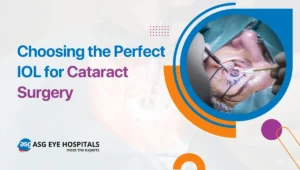Welcome to a world where vision is endless and clarity is the ruler. One remarkable journey that stands out in the field of eye health is the adventure of cataract surgery. Join us as we explore the intricate details of recovery, address the mysteries surrounding this miraculous procedure, and celebrate the successful return to a clear vision.
If you need cataract surgery to correct a cloudy lens, you are not alone. According to research, cataracts are the main cause of blindness, and cataract surgery is one of the most popular surgical procedures performed worldwide.
Cataract surgery is considered a minor procedure by medical professionals, but you may still feel nervous about having an eye surgery. Planning for your cataract surgery and understanding how it works can help you feel more confident and prepared before your surgery.
A lot of patients recover quickly from cataract surgery. Just following simple tips during the post-cataract surgery recovery time can reduce complications and speed up the process of healing.
Understanding Cataracts
Cataracts look like tiny clouds that form in the lens of your eye. Your vision becomes blurry due to this cloudiness, making it difficult to see properly. It is similar to looking through a constantly foggy window. Although they usually develop with age, cataracts can also result from trauma or specific medical disorders.
How Do You Decide If It is Time for Cataract Surgery?
When cataracts start affecting your daily life, like making it hard to read, drive, or enjoy your favorite activities, your eye doctor might suggest surgery. The good thing is, that cataract surgery is one of the most common and successful procedures. Stitches (or Not): In many cases, no stitches are needed. The incision is small enough to heal on its own. If stitches are used, they are typically tiny and will dissolve over time.
How Cataract Surgery Works:
Cataract surgery might sound scary, but it’s a quick and straightforward process. Here’s a simplified breakdown:
- Preparation: Before surgery, your eye will be measured to determine the right lens for your replacement. This lens is called an intraocular lens (IOL), and it will replace your cloudy natural lens.
- Anesthesia: You won’t feel a thing during the surgery. Most cataract surgeries use local anesthesia to numb the eye. You might also get a mild sedative to help you relax.
- Removing the Cataract: A tiny incision is made in your eye, and the cloudy lens is gently broken up and removed. Think of it like clearing away the fog on a window.
- Inserting the IOL: The IOL is placed where the natural lens used to be. This new lens helps your eye focus properly, bringing back clear vision.
Recovery After Cataract Surgery:
Now, let’s talk about what happens after the surgery. Don’t worry; recovery is usually smooth and relatively quick.
- Rest: After the surgery, you might be asked to take it easy for a day or two. Resting helps your eye heal.
- Eye Drops: Your doctor will likely prescribe eye drops to prevent infection and reduce inflammation. Follow the instructions carefully.
- Avoid Rubbing Your Eye: It’s essential to resist the urge to rub your eyes, no matter how itchy they might feel. This can interfere with the healing process.
- Follow-Up Appointments: Your doctor will schedule follow-up appointments to check your progress. These are crucial to ensuring everything is healing as it should.
- Normal Activities: Most people can resume their normal activities within a few days to a week. Just be cautious with strenuous activities that might put pressure on your eyes.
Cataract surgery is like giving your eyes a clear, new lease on life. With modern techniques and technology, it’s a safe and effective way to restore your vision. So, if you’re facing cataracts, remember, there’s a bright, clear world waiting for you on the other side of surgery



